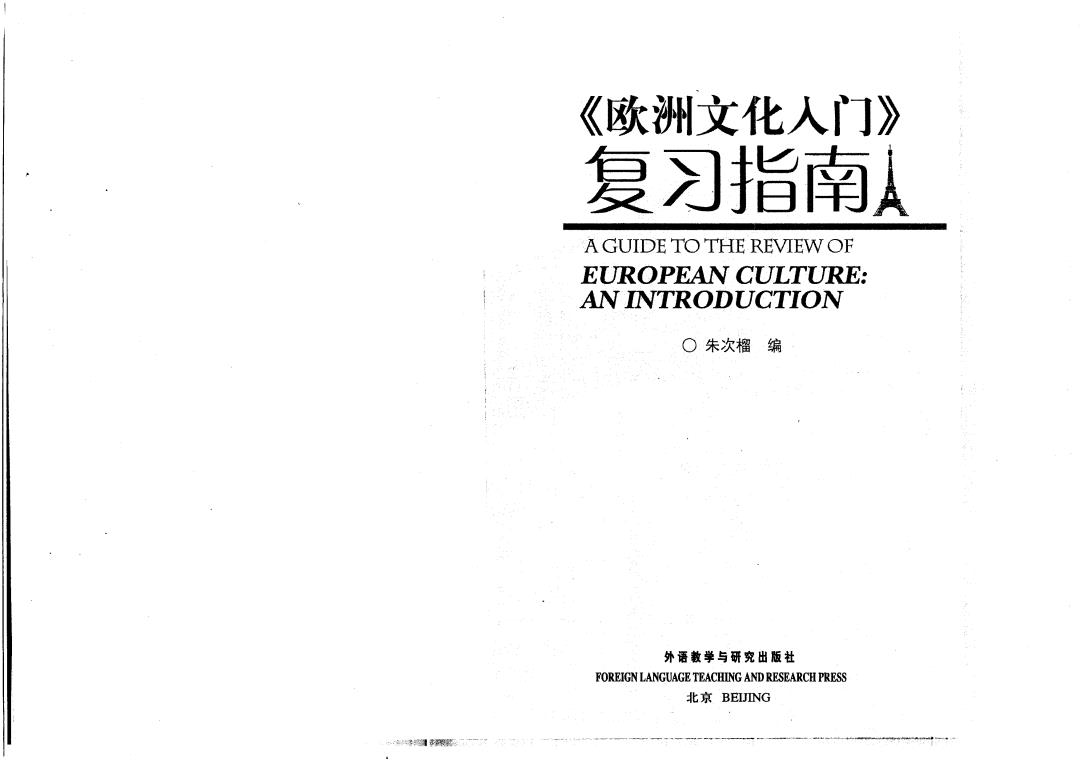
《欧洲文化人门》 复习指南A A GUIDE TO THE REVIEW OF EUROPEAN CULTURE: AN INTRODUCTION ○朱次榴编 外语教学与研究出版社 FOREIGN LANGUAGE TEACHING AND RESEARCH PRESS 北京BEIJING 子限一一
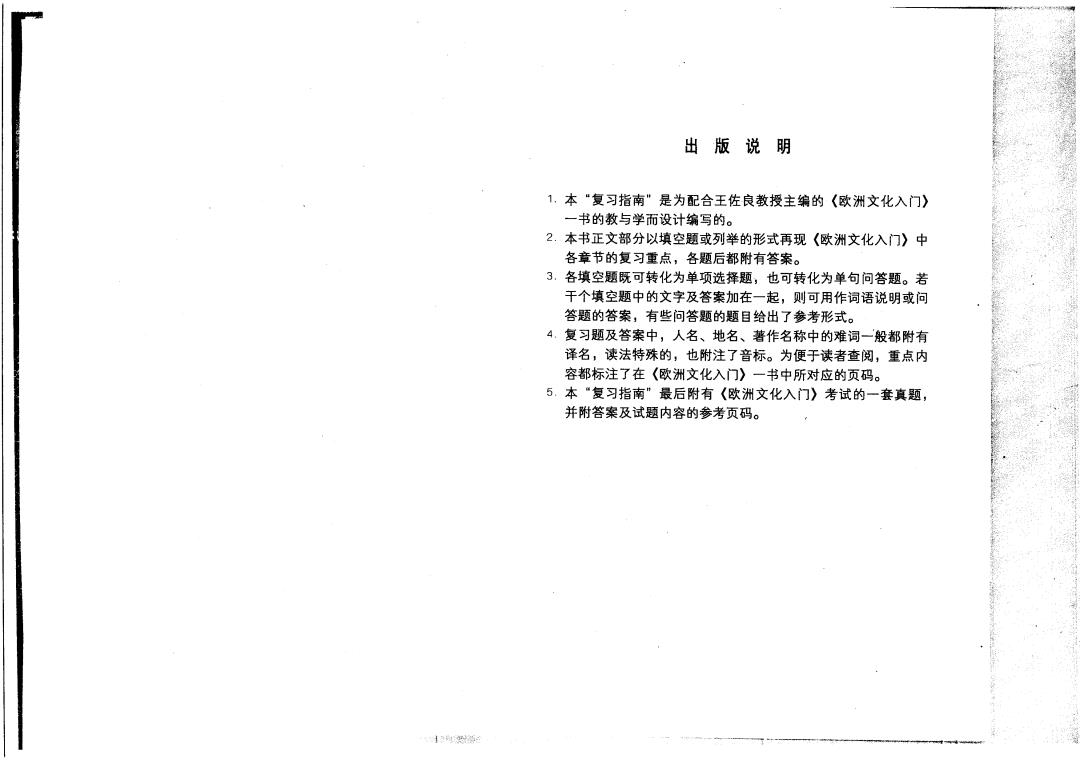
出版说明 1,本“复习指南”是为配合王佐良教授主编的《欧洲文化入门》 一书的教与学而设计编写的。 2.本书正文部分以填空题或列举的形式再现〈欧洲文化入门》中 各章节的复习重点,各题后都附有答案。 3,各填空题既可转化为单项选择题,也可转化为单句问答题。若 干个填空题中的文字及答案加在一起,则可用作词语说明或问 答题的答案,有些问答题的题目给出了参考形式。 4。复习题及答案中,人名、地名、著作名称中的难词一般都附有 译名,读法特殊的,也附注了音标。为便于读者查阅,重点内 容都标注了在〈欧洲文化入门》一书中所对应的页码。 5,本“复习指南”最后附有《欧洲文化入门》考试的一套真题, 并附答案及试题内容的参考页码。 1判德
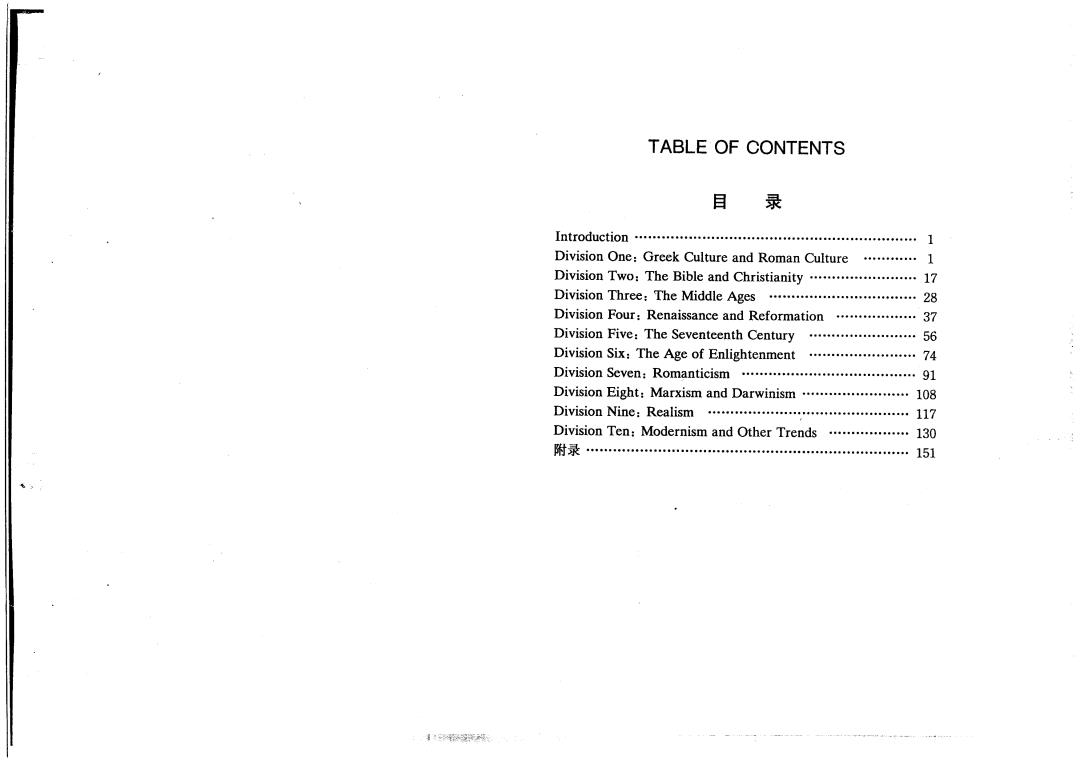
TABLE OF CONTENTS 目 录 Introducti0n…1 Division One:Greek Culture and Roman Culture 1 Division Two:The Bible and Christianity..........17 Division Three:The Middle Ages.......... 28 Division Four:Renaissance and Reformation... 37 Division Five:The Seventeenth Century …56 Division Six:The Age of Enlightenment 74 Division Seven:Romanticism.91 Division Eight:Marxism and Darwinism...108 Division Nine:Realism........117 Division Ten:Modernism and Other Trends .............130 附录 151 41法

Introduction 1.Two of the elements in European culture are considered to be more enduring and they are the element and the element. [Key:Greco-Roman(/.gri:kau'rauman/希腊罗马的)/udeo-Christian (3u:'diau'kristjon/犹太教与基督教所共有的)门 Division One:Greek Culture and Roman Culture I.Greek Culture (pp.2-36) 1.The Historical Context (p.2) 1.In a more remote period of Greek history,probably around a war was fought between Greece and Troy(/tro/特洛伊). [Key:1200B.C.] 2.Greek culture reached a high point of development in the century B.C. [Key:5th] What marked the high point of development in Greek culture in the 5th century B.C.? 3.The high point of development in Greek culture was marked by (a) the successful repulse of the invasion early in the 5th century B.C.,(b)the establishment of and (c)the flourishing of science,philosophy,literature,art and historical writing in [Key:Persian democracy Athens (/'aedanz/)] 4.The 5th century B.C.closed with civil war between and in Greece. [Key:Athens/Sparta(/'spato折巴达)] 5.In the second half of the _century B.C.,all Greece was brought under the rule of King of Macedon (/'maesidon/ 1
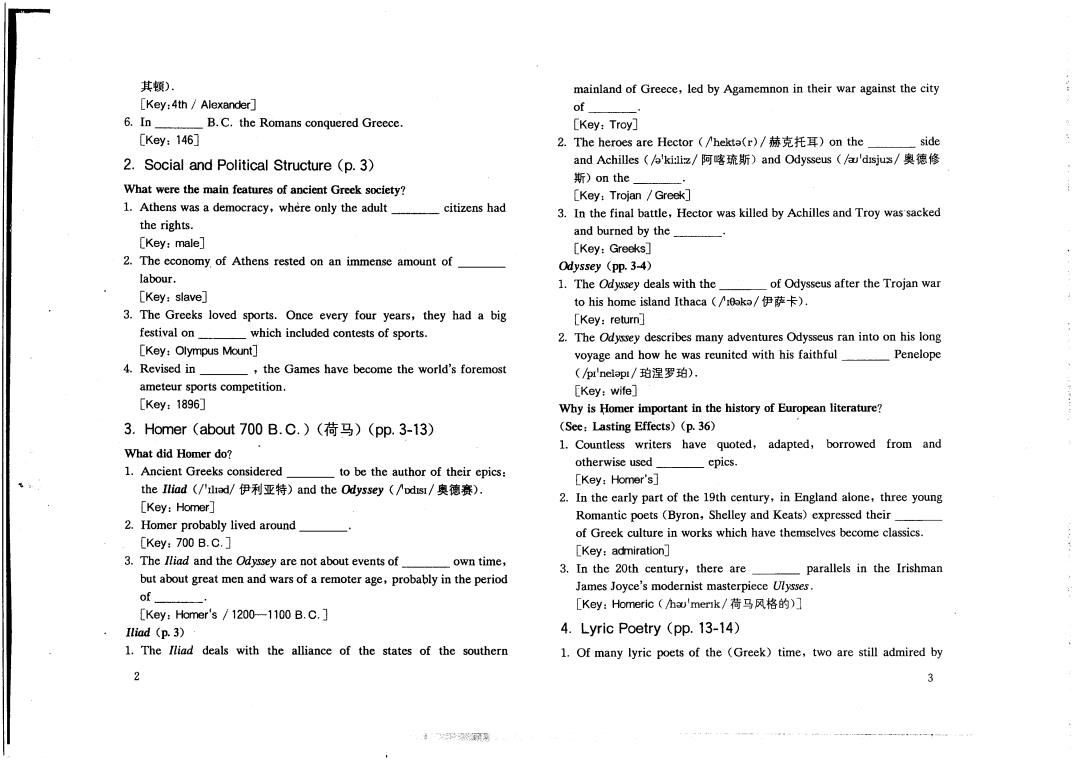
其顿). mainland of Greece,led by Agamemnon in their war against the city [Key:4th Alexander] of 6.n _B.C.the Romans conquered Greece. [Key:Troy] [Key:146] 2.The heroes are Hector(hekta(r)/赫克托耳)on the side 2.Social and Political Structure (p.3) and Achilles(/o'ki:liz/阿喀琉斯)and Odysseus('disjus/奥德修 斯)on the_ 。 What were the main features of ancient Greek society? [Key:Trojan /Greek] 1.Athens was a democracy,where only the adult citizens had 3.In the final battle,Hector was killed by Achilles and Troy was'sacked the rights. and burned by the [Key:male] [Key:Greeks] 2.The economy,of Athens rested on an immense amount of Odyssey (pp.3-4) labour. 1.The Odyssey deals with the of Odysseus after the Trojan war [Key:slave] to his home island Ithaca(:oko/伊萨卡). 3.The Greeks loved sports.Once every four years,they had a big [Key:return] festival on which included contests of sports. 2.The Odyssey describes many adventures Odysscus ran into on his long [Key:Olympus Mount] voyage and how he was reunited with his faithful Penelope 4.Revised in the Games have become the world's foremost (/pr'nelapl/珀涅罗珀), ameteur sports competition. [Key:wife] Key1896] Why is Homer important in the history of European literature? 3.Homer(about700B.C.)(荷马)(pp.3-13) (See:Lasting Effects)(p.36) What did Homer do? 1.Countless writers have quoted,adapted,borrowed from and otherwise used cpics. 1.Ancient Greeks considered to be the author of their cpics: [Key:Homer's] the Iliad(/'lad/伊利亚特)and the Odyssey(/dsI/奥德赛). 2.In the early part of the 19th century,in England alone,three young [Key:Homer] Romantic poets(Byron,Shelley and Keats)expressed their 2.Homer probably lived around of Greek culture in works which have themselves become classics. [Key:700 B.C. [Key:admiration] 3.The Iliad and the Odyssey are not about events of own time, 3.In the 20th century,there are _parallels in the Irishman but about great men and wars of a remoter age,probably in the period James Joyce's modernist masterpiece Ulysses. of [Key:Homeric(ha'merk/荷马风格的)门 [Key:Homer's 1200-1100 B.C. ·Iliad(p.3) 4.Lyric Poetry (pp.13-14) 1.The Iliad deals with the alliance of the states of the southern 1.Of many lyric poets of the (Greek)time,two are still admired by 3 1玉家

readers today: and [Key:Prometheus Bound(pra'mi:0jus/《被缚的普罗米修斯)/ [Key:Sappho (about 612-580 B.C.)(/'seefou/)Pindar (about Persians(《波斯人》)/Agamemnon(eg'memnan./《阿门农》)门 518-438B.C.)(nds(r)/品达)] b.Sophocles (496-406 B.C.)(p.17) 2.Sappho was a poet noted for her 1.Sophocles was the author of plays like and poems of passionate intensity. [Key:woman love] [Key:Oedipus the King(idps/&奥狄浦斯王)/Electra 3.Pindar is best known for his odes celebrating the victories at the (1 lektr3/《埃勒克特拉)/Antigone(/en'tgn/《安提戈涅2)] athletic games,such as the 14. odes. 2.Oedipus the King is the story of a man who unknowingly committed a [Key:Olympian] terrible sin by killing his and marrying his 5.Drama (p.14) [Key:father mother] 3.The Austrian psychiatrist Sigmund Freud's term""was also 1.Early in their remote past,the Greeks started to perform plays at derived from Sophocles's play. festivals. [Key:the Oedipus complex(恋母情结)] [Key:religious] c.Euripides (484-406 B.C.)(p.18) 2.Out of these origins a powerful drama developed in the 1.Euripides wrote mainly about in such plays as century B.C. and [Key:5th] [Key:women/Andromache(en'drpmak/《安德洛玛刻》)/Medea 3.Performances were given in theatres,with the audience (m'do/《美狄亚)/Trojan Women(tred3n/《特洛伊妇女B)] sitting on benches and looking down at the stage from 2.Euripides may be called the first writer of" sides. [Key:problem plays] [Key:open-air /stone three] d.Comedy (p.18) Outstanding Dramatists (pp.14-18) Aristophanes (about 450-380 B.C.)(p.18) 1.The outstanding dramatists of ancient Greece were 1.Aristophanes wrote such plays as_ and and. [Key:Aeschylus(/isktlas/埃斯库罗斯)/Sophocles(sofakliz/索 [Key:Frogs(g蛙)/Clouds(《云)/Nasps(《马蜂》)/Birds 福克勒斯)/Euripides(u'ripidiz/欧里庶得斯)/Aristophanes(/ (g鸟)] err'stofani:z/阿里斯托芬)] a.Aeschylus (525-456 B.C.)(p.14) 6.History (pp.19-22) 1.Aeschylus is noted for his vivid portrayal and majestic a.Herodotus(484430B.C.)(he'rodatas/希罗多德)(pp.19-20) 1.Herodotus is often called "" [Key:character /poetry] 、 [Key:Father of History] 2.Aeschylus wrote such plays as and 2.Herodotus wrote about the between Greeks and Persians. 5 ×5种3

[Key:wars] written,because it was in use in English schools until the early years b.Thucydides(about460一404B.C.)(u'sddz/修昔底德)(pp20-22) of the 20th century. 1.Thucydides told about the war between and and CKey:geometry(几何)] between Athens and Syracuse(/'sarrokjuz/锡拉库萨),a Greek state c.Archimedes(287-212B.C.)(/ak'mi:diz/阿基米德)(p.31) on the island of Sicily(西西里岛). 1.To illustrate the principle of the,Archimedes is said to have [Key:Athens /Sparta] told the king:"Give me a place to stand,and I will move the world." 7.Philosophy and Science (pp.22-32) [Key:lever] Scientists Philosophers a.Pythagoras(about500B.C.一?)(/par'Begpras/毕达哥拉斯)(p.22) a.Socrates(about470-399B.C.)(/sokratiz/苏格拉底)(p.23) 1.Pythagoras was the founder of 1.We know Socrates chiefly through what Plato recorded of him in his [Key:scientific mathematics] famous 2.To Pythagoras and his school we owe the abstract conceptions [Key:Dialogues(《对话录》)] underlying mathematics-point,line,magnitude,surface,body-and 2.The method of argument Socrates used in exposing fallacies has come the first theory of to be known as the method. [Key:proportion] [Key:dialectical] b.Heracleitus(about540-480B.C.)(/here'klartas/赫拉克利特) 3.In 399 B.C.,at the age of seventy Socrates was put on trial on a (p.22) charge of "injuring the city"by not acknowledging its and 1.Heracleitus believed corrupting the This trial was recorded by Plato in the to be the primary element of universe, out of which everything else has arisen. dialogue“ [Key:fire] [Key:gods/young/The Apology of Socrates(《苏格拉底的自我辩护 2.Heracleitus held the theory of the mingling of opposites and believed 词》)1 it was the between the opposites that produced b.Plato(about428-348B.C.)(plerta/柏拉图)(pp.26-27) writing but also [Key:strife harmony] 1.Plato's Dialogues are important not only as c.Democritus(about460-370B.C.)(仙'mokritas/德谟克利特) as literature. (p.22) [Key:philosophical /imaginative] 1.Democritus speculated about the 2.Of the Dialogues Plato wrote,27 have survived,including structure of matter.He was one of the earliest exponents of the atomic theory. ,and [Key:atomic] [Key:the Apology(《辩解篇)/Symposium(《会饮篇)/the Republic d.Euclid(3 rd Century B.C.)(jw:kld/欧几里得)(p.31) (《理想国篇)门 defence of himself at the trial. l.Euclid is even now wel-known for his Elements(《几何原本》),a 3.Plato's Apology was about [Key:Socrates'] textbook of,perhaps the most successful textbook ever 4.Plato's Symposium dealt with and

[Key:beauty love] and insisted that theory should follow _This is different 5.Plato's Republic was about the state ruled by a but from Plato's reliance on thinking. barring poets. [Key:direct /fact /subjective] [Key:ideal philosopher] 2.Also,Aristotle thought that "form"(=idea)and matter together. 6.Plato's comprehensive system of philosophy dealt with,among other made up concrete individual realities.Here,too,he differed from Plato things,the problem of how,in the complex,ever-changing world, who held that ideas had a reality than the physical world. men were to attain [Key:higher] [Key:knowledge] What is Aristotle's most influential writing to students of literature?(p 28) 7.The reply Plato gave (to the problem of how men were to attain 1.To students of literature,Aristotle's most influential writing is knowledge)was:men have knowledge because of the existence of certain general“ideas'”,like__ [Key:Poetics] LKey:beauty truth goodness] d.Contending Schools of Thought (pp.29-31) 8.According to Plato,only such "ideas"as beauty,truth,goodness are completely while the world is only relatively real. i.The Sophists(sofrsts/诡辩派)(p.29) 1.The most eminent of the Sophists was Protagoras (/prou'tegras/ [Key:real /physical] 塔哥拉),born about500B.C.He is chiefly noted for his doctrine 9.Plato's philosophy is called Idealism because [Key:in his system of philosophy only such"ideas"as beauty.truth and that“". goodness are regarded as completely real while the physical world is [Key:man is the measure of all things] regarded as only relatively real] i.The Cynics(siniks/犬儒派)(p.29) c.Aristotle(384-322B.C.)(eeristol1/亚里士多德)(pp.27-28) l.The word“cynic'”means“_"in Greek. 1.Of Aristotle's numerous works,the following are perhaps still [Key:dog] important to scholars and general readers alike: 2.The Cynics got their because Diogenes (about 412-323 B. ,and C.)(aar'od3tniz/第欧根尼),one of their leaders,decided to live [Key:Ethics(《伦理学》)/Politics(《政治学)/Poetics(《诗学)/ like a dog. Rhetoric(《修辞学)] [Key:name] 2.Aristotle's Ethics was an introduction to philosophy. 3.Diogenes rejected all [Key:moral] [Key:conventions] 3.Aristotle's Poetics was a treatise on theory. 4.Diogenes advocated in life. [Key:literary] [Key:self-sufficiency and extreme simplicity] 4.Aristotle's Rhetoric dealt with the art of an audience. 5.Diogenes proclaimed his not only with the whole human [Key:persuading] race,but also with In what way or ways did Aristotle differ from his teacher Plato?(p.28) [Key:brotherhood /animals] 1.For one thing,Aristotle'emphasized observation of nature 6.On the other hand,Diogenes had no patience with the and 8 9 01名5
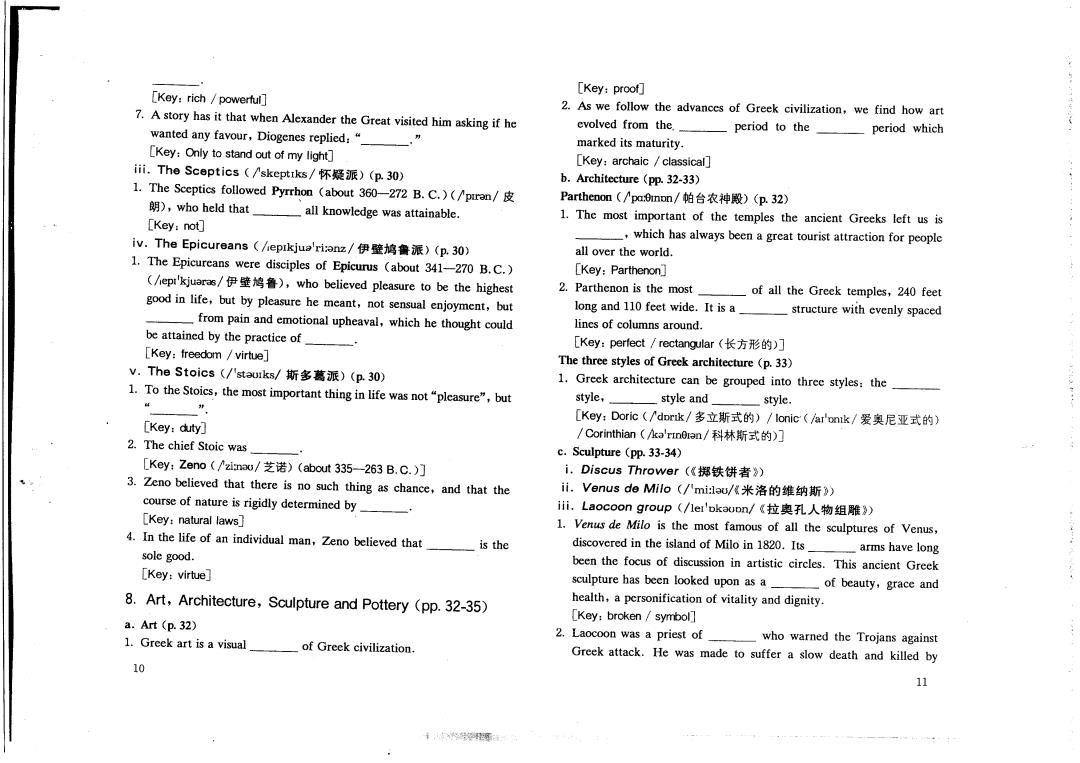
[Key:rich powertul] [Key:proof] 7.A story has it that when Alexander the Great visited him asking if he 2.As we follow the advances of Greek civilization,we find how art evolved from the. wanted any favour,Diogenes replied:"" period to the period which marked its maturity [Key:Only to stand out of my light] [Key:archaic /classical] iii.The Sceptics(skeptrks/怀疑派)(p.30) 1.The Sceptics followed Pyrrhon (about 360-272 B.C.)(/piran/ b.Architecture(pp.32-33) )who held that all knowledge was attainable. Parthenon(pa:0inon/帕台农神殿)(p.32) [Key:not] 1.The most important of the temples the ancient Greeks left us is iv.The Epicureans(/eprkjua'ri3nz/伊壁鸠鲁派)(p.30) ,which has always been a great tourist attraction for people all over the world. 1.The Epicureans were disciples of Epicurus (about 341-270 B.C.) [Key:Parthenon] (/epr'kjuaras/伊壁鸠鲁),who believed pleasure to be the highest 2.Parthenon is the most good in life,but by pleasure he meant,not sensual enjoyment,but of all the Greck temples,240 feet long and 110 feet wide.It is a from pain and emotional upheaval,which he thought could structure with evenly spaced lines of columns around. be attained by the practice of [Key:perfect/rectangular(长方形的)] [Key:freedom virtue] v.The Stoics(/'stauiks/斯多葛派)(p.30) The three styles of Greek architecture (p.33) 1.To the Stoics,the most important thing in life was not"pleasure",but 1.Greck architecture can be grouped into three styles:the 4 ” style,style andstyle. [Key:duty] [Key:Doric(/dprk/多立斯式的)/lonic(ar'onk/爱奥尼亚式的) /Corinthian(ka'rin0ran/科林斯式的)门 2.The chief Stoic was c.Sculpture (pp.33-34) [Key:Zeno(zi:nao/芝诺)(about335-263B.C.)] i,Discus Thrower(《掷铁饼者) 3.Zeno believed that there is no such thing as chance,and that the ii.Venus de Milo(/'mi:lau/%米洛的维纳斯) course of nature is rigidly determined by iii.Laocoon group(/1er'pkauon/《拉奥孔人物组雕》) [Key:natural laws] 4.In the life of an individual man,Zeno believed that 1.Venus de Milo is the most famous of all the sculptures of Venus, is the discovered in the island of Milo in 1820.Its arms have long sole good. been the focus of discussion in artistic circles.This ancient Greek [Key:virtue] sculpture has been looked upon as a _of beauty,grace and 8.Art,Architecture,Sculpture and Pottery (pp.32-35) health,a personification of vitality and dignity. [Key:broken symbol] a.Art (p.32) 1.Greek art is a visual 2.Laocoon was a priest of of Greek civilization. who warned the Trojans against Greek attack.He was made to suffer a slow death and killed by 10 11 卡安哪在

serpents with his sons because of this.This sculpture is known for its successful depiction of theof Laocoon's face-fear, II.Roman Culture (pp.37-49) sympathy and terror. 1.Romans and Greeks (pp.37-38) [Key:Troy expressions] 1.The burning of Corinth in marked the Roman conquest of d.Pottery (pp.34-35) Greece,which was then reduced to a province of the Roman Empire. 1.The flourishing of the Greek pottery was a result of [Key:146B.c.] [Key:domestic needs and needs for foreign trade] w was the language of the western half of the Roman Empire, 9.Impact (pp.35-36) that of the eastern half. 1.Rediscovery of Greek culture played a vital part in the [Key:Latin Greek] Italy and other European countries. What did the Romans have in common with the Greeks?And what was the [Key:Renaissance] chief difference between them?(p.38) 2.Karl Marx,once wrote about the Greeks:"Why should't the childhood of 1.The Romans had a lot in common with the human society...exercise an eternal charm,as?" [Key:Greeks]. [Key:an age that will never return] 2.Both the Romans and Greeks had rooted in the idea of the a.Spirit of Innovation citizen-assembly,hostile to monarchy and to servility. 1.The Greeks invented mathematics and science and philosophy;they [Key:traditions] first wrote history as opposed to mere annals;they speculated freely 3.Their were alike enough for most of their deities to be about the of the world and the ends of life,without being readily identified-Greek Zeus with Roman Jupiter (/'d3u:prt(r)/), bound in the fetters of any inherited orthodoxy. Greek Aphrodite (/efrau'darti/)with.Roman Venus,and so on-and [key:nature their myths to be fused. b.Supreme Achievement [Key:religions] 1.The Greeks achieved supreme achievements in nearly all fields of 4.Theirworked in similar ways,and were ultimately related, both being members of the Indo-European language family which [key:human endeavour] stretches from Bangladesh(/'bagla,def/盂加拉)to Iceland. c.Lasting Effect [Key:languages] 1.The Greeks set an example by the bold effort they made to understand 5.There was one big difference.The Romans built up a vast the world by the use of the Greeks didn't,except for the brief moment of Alexander's [key:human reason] conquests,which soon disintegrated. [Key:empire] 2.Roman History (p.38) 1.The year divided the history of Rome into two periods. 12 13 容经